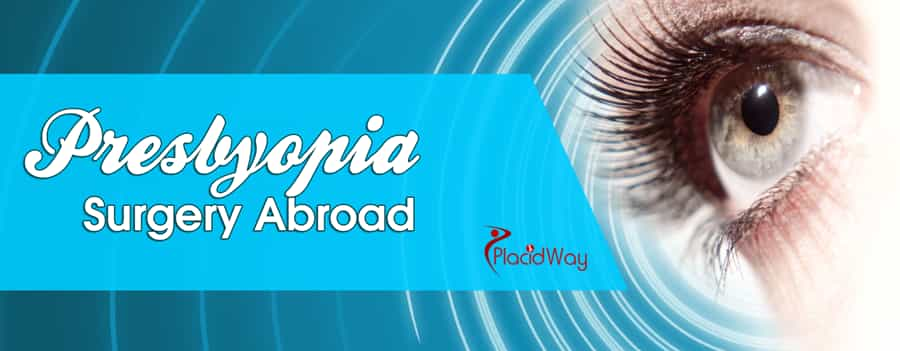
Presbyopia Surgery Abroad
Overview
 resbyopia
resbyopia is a common vision disorder that often affects people when they head into their 40s or later. The word comes from the Greek word that means "old sight".
Presbyopia, by medical definitions, defines the loss of the ability of the eye lens to change focus while accommodating between distant and near objects. This process of accommodation and focusing takes place when the muscles that surround the eye literally changed the shape of the lens it due to aging, weakening, or thinning. Very few people pass their 40s or 50s without experiencing some degree of presbyopia.
The Importance of Focus
Without its ability to focus and adapt between near and far objects, it takes longer for your eyes to adjust. The problem is caused by light rays that reflect from nearby objects, which focus on a point on the lens behind the retina, and therefore look out of focus. For those who are farsighted, called hyperopia, this happens when the eyeball itself is shorter than normal. In presbyopia, this is caused by an aging lens that grows less flexible with age. That makes it difficult for the lens to bend light rays more sharply in an effort to move the focal point forward onto the retina rather than behind it.
The most common and earliest signs of presbyopia is the increasing need to hold printed material further from the eyes to read it clearly. This is because the ciliary muscles that surround our eye are too worn out to focus on close objects. After reading, it takes longer for the eyes to focus on more distant objects. This is because it takes longer for the eye to adjust.
An individual can be diagnosed with presbyopia in addition or regardless of other visual issues including astigmatism, nearsightedness, or farsightedness. At the same time you start noticing symptoms of presbyopia, you may also notice that your night vision decreases. That's because the pupil doesn't open or dilate as easily as it used to, and the iris, or color portion of the eye, takes longer to react to light variations. Some changes in the lens structure may even block some light rays.
Presbyopia Treatment
The only treatment for presbyopia used to be limited to optical correction, meaning contact lenses or reading glasses. A person who already wears glasses or contacts may need bifocals, where the upper portion of the glass lens is used for distance, and the lower portion of the glasses are used for closer work.
However, a new technology known as Kamra inlay has been developed and is used globally. The procedure implants a device smaller than a contact lens into the eye to treat presbyopia, or at a minimum, reduce the need of individuals to wear reading glasses. The
implant is inserted into the cornea. The center of the Kamra inlay is an opaque, circular micro disc with a very small (1.6 mm) opening in its center. It is designed to block unfocused light, allowing only focused light to reach the retina. The disc also comes with over 8,000 laser-etched and high precision micro-openings along the inlay surface to help maintain corneal health. The inlay has been developed over the past decade, and is currently available in South America, Asia, and Europe and Canada.
Presbyopia can worsen over time, and prescription glasses may need to be changed up until the age of 65, when presbyopia usually stabilizes. However, by the time most people reach the age of 65, the focusing ability of the eye has a decreased to nearly nil due to the inflexibility of the lens.
What Does Presbyopia Care Cost?
Cost for optical correction methods (glasses, contacts) are fairly inexpensive. The Kamra inlay procedure costs approximately $10,000, and takes roughly fifteen minutes to complete. Much like a Lasik eye treatment, results are immediate.
Who Provides Care for those Diagnosed with Presbyopia?
Examination, diagnosis, and counseling regarding macular degeneration and options available are typically performed by an ophthalmologist or optometrist who specializes in the treatment of those with poor vision. An ophthalmologist should be licensed and trained and certified to perform eye surgical procedures. He or she should also be trained to use of laser and ultrasound equipment. Medical licensing in the United States is by local, state, and national medical boards.
If you want to know more, you can always contact us and ask for more info.

 resbyopia is a common vision disorder that often affects people when they head into their 40s or later. The word comes from the Greek word that means "old sight". Presbyopia, by medical definitions, defines the loss of the ability of the eye lens to change focus while accommodating between distant and near objects. This process of accommodation and focusing takes place when the muscles that surround the eye literally changed the shape of the lens it due to aging, weakening, or thinning. Very few people pass their 40s or 50s without experiencing some degree of presbyopia.
resbyopia is a common vision disorder that often affects people when they head into their 40s or later. The word comes from the Greek word that means "old sight". Presbyopia, by medical definitions, defines the loss of the ability of the eye lens to change focus while accommodating between distant and near objects. This process of accommodation and focusing takes place when the muscles that surround the eye literally changed the shape of the lens it due to aging, weakening, or thinning. Very few people pass their 40s or 50s without experiencing some degree of presbyopia.